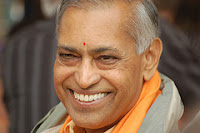
Mantra From "Chopra Center Library"
The word mantra has two parts: man, which is the root of the Sanskrit word for mind; and tra, which is the root of the word instrument.
A mantra is therefore an instrument of the mind, a powerful sound or vibration that you can use to enter a deep state of meditation.
According to the Vedic tradition, the ancient sages were able to hear the subtle vibrations produced by everything in nature?the sounds
of the wind, thunder, butterflies, rushing rivers and all other creations. They recognized that these sounds are the manifestation of spirit into matter.
They identified “Om” (or aum) as the most elemental sound, representing the infinite universal consciousness
For thousands of years, people have used this mantra to expand their awareness of the divine.
The ancient seers also identified all the primordial vibrations or mantras that make up the universe,
and these were eventually recorded in the Vedic literature?the four texts that form the basis for the Hindu religion.
You can actually hear all the mantras yourself if you sit quietly. You’ll notice a background hum in the air, and as you practice
focusing on that hum, you’ll ultimately hear every mantra the sages recorded long ago.
Silently repeating a mantra as you meditate is a powerful way to enter the silence of the mind.
As you repeat the mantra, it creates a mental vibration that allows the mind to experience deeper levels of awareness.
As you meditate, the mantra becomes increasingly abstract and indistinct, until you’re finally led into the field of pure consciousness from which the vibration arose.
In the deepest meditative state, all thoughts and worries drop away and you experience the quiet that always exists beneath the noisy internal dialogue of the mind.
In this stillness you may feel oneness with all life and profound peace.
Each mantra induces specific vibrations in the mind, which is why people use different mantras depending upon their intentions.
However, mantras don’t have particular meanings?they are simply vibrations of consciousness.
When they’re silently repeated, they help us disconnect from the thoughts filling our mind and slip into the gap between thoughts.
Some spiritual traditions put great emphasis on the correct pronunciation of mantras. After decades of experience,
The Chopra Center's perspective is that the exact pronunciation of the mantra doesn’t matter at the non-local level of intelligence.
If someone tries to maintain distinct pronunciation while the mind is in the process of transcending, the conscious effort for right pronunciation will undermine the natural meditation process.








